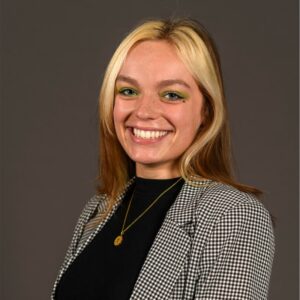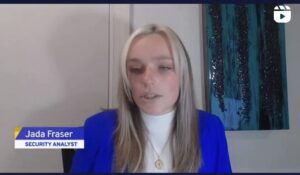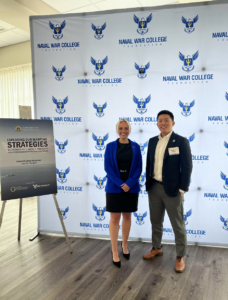 Jada joined ATA in 2019 by way of The Annette Strauss Institute for Civic Life. She was integral in researching and writing our 2020 Census series, in addition to contributing policy and outreach materials on elections and why every vote matters!
Jada joined ATA in 2019 by way of The Annette Strauss Institute for Civic Life. She was integral in researching and writing our 2020 Census series, in addition to contributing policy and outreach materials on elections and why every vote matters!What was one thing you learned while interning for ATA that you still use in your current professional life?
ATA provided me with my first opportunity to research, write, and publish on a topic of my choosing. In other words, it was the first time I got to pursue a topic I was passionate about in a way that allowed me to think critically about an issue and share those thoughts with others through an established platform. Of course, that topic was one that was relevant to ATA’s work– so in another sense, it was a helpful exercise in learning how to combine personal interests and work (or how to make one relevant to the other). These skills–researching, writing, critical thinking, and integrating personal passions with work–are all skills that I use in my current professional life. They are the skills that have enabled me to continue to publish throughout my career.
How did your interning experience help prepare you for the professional world?
My internship at ATA prepared me to be successful in the professional world in a simple, but to me, too-often-underestimated way: by providing me the opportunity to learn what the expectations are, and the necessary skills to meet them, of a successful employee (regardless of field or industry). Transferrable skills like meeting deadlines, how to receive critical feedback and make appropriate adjustments, how to work as a member of a team, and the invaluable qualities of proactiveness and creativity (and I don’t mean this in a literal artistic sense, I don’t have an artistic bone in my body).
 To give an additional more specific example, my internship at ATA played a crucial role in giving me confidence in my ability to contribute my own opinions and ideas in the workplace. As a supervisor, Sarah created a work environment that encouraged active contributions from interns, free from anxieties of having our ideas shot down or being made to feel like we didn’t “know enough” to participate in a conversation. The relationship Sarah built with me while I was an intern was one that didn’t create hierarchical barriers between “supervisor” and “intern,” in which I felt valid in sharing my opinions and ideas. In my other experiences, when such barriers existed they tended to reinforce the idea that interns should merely “do what they’re told” rather than propose ideas, make suggestions, or question directions they’re given.
To give an additional more specific example, my internship at ATA played a crucial role in giving me confidence in my ability to contribute my own opinions and ideas in the workplace. As a supervisor, Sarah created a work environment that encouraged active contributions from interns, free from anxieties of having our ideas shot down or being made to feel like we didn’t “know enough” to participate in a conversation. The relationship Sarah built with me while I was an intern was one that didn’t create hierarchical barriers between “supervisor” and “intern,” in which I felt valid in sharing my opinions and ideas. In my other experiences, when such barriers existed they tended to reinforce the idea that interns should merely “do what they’re told” rather than propose ideas, make suggestions, or question directions they’re given.
This experience played a formative role in shaping how I hold myself in the workplace today. For a bit of personal context, I’m a young woman in the national security field. A field that is overwhelmingly dominated by old, white, heteronormative men. There is ABSOLUTELY a sense in my field that if you don’t meet at least one of those three characteristics, your opinion is not as valued or valid. And even for those women whose opinions are seen as valid or valued, they’re often not sought out for leadership roles, etc. in comparison to their male counterparts. In spite of these barriers, I have never once allowed myself to feel like I have nothing of value to offer while in a meeting, working on a project, participating in a conference, writing an article, or applying for a position. Some of that is certainly owed to my own privileged position as a white, hetero-presenting, woman, and to my own extroverted personality. But it cannot be overstated how significant a role my experience at ATA with Sarah as my supervisor played in shaping me to hold myself in such a way.
Looking back on your experience, what is one vital piece of information you would give to me and future interns?
During your internship, and after it is over, take the time to reflect on things that you enjoyed and that you didn’t. Especially as a student, or someone early in their professional career, it is just as important to discover and pursue the things you do enjoy as it is to learn the things that you do not enjoy. Knowing what kinds of work-related things you don’t find interesting, or that you don’t think take advantage of your skills, or cause you to feel unmotivated, is extremely important to ensuring 2 things: 1) that the work you do is personally fulfilling and 2) that you can best contribute to the success of that work.
How important is civic engagement in your current role/where you’re living now/in your current situation/school/etc?
 That’s an interesting question when applied to my field/role. Generally speaking, I am a quote-end-quote “foreign policy and national security analyst.” That is to say, while I have had different job titles and worked for different places, my work generally focuses on researching and writing on the foreign policy of the United States and associated opportunities and challenges for U.S. national security strategy. Unfortunately, compared to domestic policy, foreign policy tends not to attract the same levels of civic engagement (it can be argued that it has been intentionally arranged to be this way). On the one hand, this makes sense– while I can spend hours arguing the opposite, to the average American the impact of U.S. foreign policies on their daily life and associated decision-making processes is negligible. On the other, this comparative lack of civic engagement in foreign policy and national security can lead to inequitable and sometimes disastrous outcomes.
That’s an interesting question when applied to my field/role. Generally speaking, I am a quote-end-quote “foreign policy and national security analyst.” That is to say, while I have had different job titles and worked for different places, my work generally focuses on researching and writing on the foreign policy of the United States and associated opportunities and challenges for U.S. national security strategy. Unfortunately, compared to domestic policy, foreign policy tends not to attract the same levels of civic engagement (it can be argued that it has been intentionally arranged to be this way). On the one hand, this makes sense– while I can spend hours arguing the opposite, to the average American the impact of U.S. foreign policies on their daily life and associated decision-making processes is negligible. On the other, this comparative lack of civic engagement in foreign policy and national security can lead to inequitable and sometimes disastrous outcomes.
I can give any number of specific examples of the negative impacts of this lack of civic engagement, but in the interest of keeping things brief (as I’m sure you can see by now, not one of my strong suits) I’ll talk about one issue that I see as really important and the little things I do and small ways I intentionally do my work and interact with others that I hope all amount to making some impact on increasing civic engagement in my field to create more equitable outcomes.
One of the most widely discussed and debated issues in U.S. foreign policy/national security is strategic competition with China and the rising possibility of an invasion of Taiwan. As you may be aware of, these issues have been contorted and weaponized by some to exacerbate anti-Asian hate in the U.S. and to conflate the wrongdoings of the Chinese Communist Party with the entirety of the Chinese people and the country itself. These issues are implicitly exacerbated in a number of small ways that I actively try to work against. As an example, when writing on U.S.-China issues, notice the difference in these two sentences.
1: “Due to the Chinese threat, the U.S. is increasing its defense budget in preparation for China’s potential invasion of Taiwan– an event that would spark a war pitting China against Western democracies.”
2: “Due to the aggressive actions of the People’s Liberation Army and the vitriolic rhetoric being used by Xi Jinping and the Chinese Communist Party, the U.S. is increasing its defense budget in preparation for a potential PRC invasion of Taiwan– an event that would likely spark a war between the U.S. and allied countries.”
In comparison to the 1st sentence’s language that casts China and the Chinese people as a “monolith” and emphasizes divisionary and ethnocentric language such as “Western democracies,” the 2nd sentence categorizes its subjects more specifically as “Xi Jinping,” the “PLA,” “CCP,” and the “PRC”. By dropping the use of the term “Western” and not mentioning “democracies,” the 2nd sentence also does not create the same kind of mental image of a “clash of civilizations” that the first sentence implies. I always write my sentences along the lines of the second sentence, and when I edit and revise others’ papers, I make those changes. This same way of intentionally writing and speaking applies to many different topics outside of just U.S.-China relations.
So in summary of a very long-winded way to answer your question, while civic engagement is not as immediately apparent in its impact on my work, or directly tie into my role, it is certainly relevant, and I try to integrate the two where I can. Though, this question has prompted me to reflect on what more I could be doing, and I hope to be more intentional about bringing in more of this civic engagement perspective to my work moving forward.
